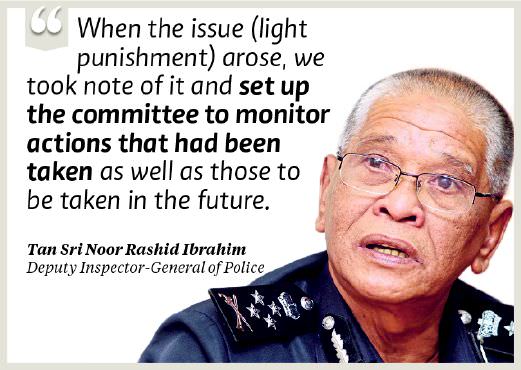KUALA LUMPUR: A committee under the purview of the police’s two top officers is responsible for monitoring and ensuring that punishments, imposed on its wayward officers, commensurate with the offences committed.
Deputy Inspector-General of Police Tan Sri Noor Rashid Ibrahim said the committee was set up some time ago after the force found out that some punishments imposed were considered “too lenient”.
“When the issue (light punishment) arose, we took note of it and set up the committee to monitor actions that had been taken as well as those to be taken in the future.
“The committee has also met with the management at the contingent level to discuss the matter,” he said.
Noor Rashid, however, declined to reveal details of the committee, but said every offence committed was being monitored to ensure integrity within the force was at its highest level.
For offences that were deemed not serious, the management of the contingents, he said, could decide on the punishment on its own.
However, for more serious offences, which could result in sacking the personnel in question, they would be referred to the highest level of the force.
Cases involving rank-and-file officers, said Noor Rashid, would be referred to him for a final decision while cases involving more senior officers would be referred to the inspector-general of police.
Serious offences committed by personnel with the rank of assistant commissioner and above would be referred to the Police Force Commission, he said.
Noor Rashid said whenever complaints were lodged, investigations would be initiated.
It is the same for cases lodged with the Enforcement Agencies Integrity Commission.
“An investigation will be conducted by the police and we will decide on the action based on our findings.
“It is up to the disciplinary body (Integrity and Standard Compliance Department) to decide on what action is to be taken under the Civil Servants Act and its decision would be final,” he said.
The Immigration Department, on the other hand, said it had roped in the Malaysian Anti-Corruption Commission (MACC) to monitor and conduct programmes to strengthen its staff’s integrity.
“The department’s Integrity Division, formed several years ago, is headed by an officer from the MACC.
“This unit will conduct programmes to boost the officers’ integrity,” said an official in the department. A source said the department would normally opt to transfer errant officers with whom they had difficulties proving their misconduct to a “less sensitive” post.
“The instruction is to rotate those in ‘hot positions’ every three years.
“For those in “hotter” positions, they would be transferred out after a year.
“The department will also monitor officers who live beyond their means.
“If the department doesn’t have solid evidence to prove the officers’ misconduct, the department will transfer them to a less sensitive post, such as to the management or the training unit,” the source said.-nst







